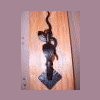-
Posts
34 -
Joined
-
Last visited
Contact Methods
-
Yahoo
bjalongi
Converted
-
Location
Arlington, WA
-
Biography
I'm a guy and I beat steal, sometimes for money, usually for fun.
-
Interests
Fishing, hunting, you know, guy stuff.
-
Occupation
UW Student - Blacksmith/Knifemaker to pay the bills
-

I clench my teeth working on the anvil
wapiti_forge replied to wapiti_forge's topic in Blacksmithing, General Discussion
I used to clench my teeth when I'd pull a hard move when I climbed a lot. It was pretty bad on long leads in the valley. Glad I'm not standing on long strings of heads and hooks anymore. I swing pretty hard when I'm reducing large stock and that's when I do it. I paid close attention this afternoon. -

Doghead Dragon...Kinda
wapiti_forge replied to J W Bennett's topic in Blacksmithing, General Discussion
Do you have a carving block? it looks a little twisted. That happens when you try to do the punch work in the vice without a block. They are really easy to make. I really like it though. Very cool. -
My dentist swears up and down that I grit my teeth when I sleep. I've told him for a few years that he's crazy. Today i realized I clench my teeth when I'm working on the anvil. Can't help it, it just happens. I stay quite relaxed when I'm working, but my jaw really tightens up. Once I realized it I tried to not do it, but it was really hard. That will take a lot of conscious effort while I'm working. Anybody else do this?
-

When is good enough actually good enough?
wapiti_forge replied to Glenn's topic in Blacksmithing, General Discussion
Depends on what you're making. I absolutely never have that attitude until the bitter end when making a custom knife. However, performance is crucial, and what I consider "good enough" on a knife is beyond anal retentive to most people. Artistic iron work is different.... good enough is a common phrase in my smithy when I'm doing anything other than knives. -
You could use plumb brown gun finish on them perhaps. It induces oxidation and holds oil really well. Or, just oil them after they get a rusty patina.
-

First posting of my work on this forum
wapiti_forge replied to wapiti_forge's topic in Blacksmithing, General Discussion
Thanks for all the complements folks. What a warm welcome. I hope to share some of my future projects with you. Take care, Brook -
You can't go wrong with a blacksmith knife style letter opener.
-
You can buy a few pounds of satanite powder for the same price as a few tubs of furnace cement. You also might consider ITC-100. Both are easier to mix and apply. They also last longer in the forge. Furnace cement will get brittle if you forge often and will start to fall apart. Having said that, I know a few full time blacksmiths that don't even bother with coating their ceramic wool anymore. Their forge bodies are roughly 12-14" in diameter, lined with about 1.5-2" of wool. However, they do not forge weld in them. They could probably still weld in them if they at least coated the bricks on the bottom with ITC, or even furnace cement. The flux eats up the wool really fast.
-
The rough sand finish you're talking about could be pitting, but I can't tell without a photo. Most of the old Swage blocks I've seen were less than perfect and often had an orange peel like surface. That is a good price if they are heavy. I'd buy all three and resell two. The profit would make it worth it, and you'd get a free swage block in the process. They also make great trade stock.
-
Deleted. Good luck.
-
Clear engine enamel from Napa autoparts.
-
Look at Wayne Goddard's $50 Knife Shop. It will answer all of your questions and help you get started with little investment. It is on Google Books for free. Some pages are missing though. It runs for about $20 online. Good luck. - Brook
-
There are tons of great blacksmithing 101 videos on the web. Youtube is a great place to start. Also check your local library. A rainy afternoon, some hot coffee and a great book will give you a good basic working knowledge. Here are a few books in publication that you can view on Google Books. The Modern Blacksmith is often at most libraries nowadays. The complete modern blacksmith - Google Books New edge of the anvil: a resource ... - Google Books Good luck!
-
Just start working on the anvil. Developing proper hammer control is more important when you begin. You could spend hours grinding, welding, perhaps even forging your horn to a perfect point, then screw up all your work because you haven't learned to control your hammer. People who have worked in construction, or big wall climbers who climb nail up routes, etc. often already have strong hammer skills from the get go, but still need refinement. You could be in this category, I don't know. You won't have a huge need for a fine point on your anvil right now anyway. If you do, just forge down a piece of large round stock and stick it in your vice when you need a fine pointed horn. It would be a good introductory project. If you do enjoy blacksmithing, you'll probably upgrade to a better anvil down the road. I'm not sure if you're anvil is cast iron or not. I can't remember from the original post. If it is a cheap cast iron anvil you won't be able to forge the point out anyway. Happy hammering, Brook
-

First posting of my work on this forum
wapiti_forge replied to wapiti_forge's topic in Blacksmithing, General Discussion
Thank you very much! That is a kind offer. PM inbound. - Brook
